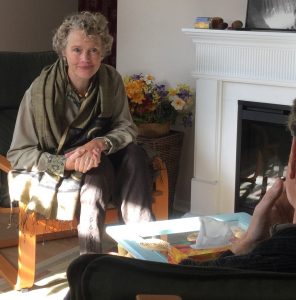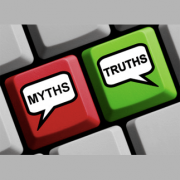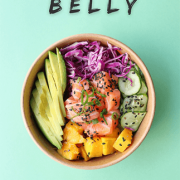How to Be Assertive About Your GF Dietary Needs
- Celiacs often face upsetting social situations around food. We fear that being assertive about our needs will seem rude, and we don’t want to offend anyone or wreck anyone’s fun.

Sherry Scheideman, Registered Clinical Counsellor
Celiac Counsellor’s Corner* is a place where Sherry Scheideman, M.A., Registered Clinical Counsellor, responds to your questions about the emotional and social issues that celiacs face. Diagnosed with celiac disease herself in 2001 in Victoria, BC, Sherry draws upon personal experiences and a Master’s Degree in Counseling to support you in transcending this ‘life transition’ and turning it into an opportunity to live your best life – ever.
Do you have a comment or question for Sherry?
 Celiacs often face upsetting social situations around food. We fear that being assertive about our needs will seem rude, and we don’t want to offend anyone or wreck anyone’s fun.
Celiacs often face upsetting social situations around food. We fear that being assertive about our needs will seem rude, and we don’t want to offend anyone or wreck anyone’s fun.
But, when we don’t speak up for ourselves, we are being rude to ourselves by denying ourselves the care that we need — and we’re being rude to others by deceiving them about our true experience.
Honour yourself by noticing your own needs and speaking up about them. Honour others by letting them deal with their own reactions and responses.
Here are some tips for being assertive about your dietary needs.
1. Explain the facts calmly, simply, and briefly.
EXAMPLE: “You know how some people have severe reactions to bee stings, peanuts, or seafood? Well, I have severe reactions to gluten — and gluten is in almost everything, so I have to be really careful.”
2. Use Non-Violent Communication (NVC) to:
1. express your feelings
2. express your needs
3. make requests to get your needs met.
A guideline for this is the famous NVC “I-Statement” formula, which goes like this:
When ______, I feel ______, because my need for______ is not being met. Would you be willing to ______?
EXAMPLE 1: “When there’s a lot of gluten around my food preparation area, I feel scared, because my need to have safe food is not being met. Would you be willing to reserve a section of the counter for me only?”
EXAMPLE 2: “When I am pressured to eat something that I think might be unsafe for me, I feel miserable, because my need for respect is not being met. Would you be willing to say ‘Oh, ok’ when I say ‘No thank you’ to a food you’re offering me?”
EXAMPLE 3: “When I am a guest where everyone else eats gluten, I feel anxious, because my need for food safety is at risk. Would you be willing to let me prepare all my own food?”
EXAMPLE 4: “When other people use my groceries, I feel jittery, because my need for a secure and dependable food supply is at risk. Would you be willing to never use the products I’ve labelled GF, and to ask before you use any of my other groceries?
3. If you have gone through Steps 1 & 2 above but people are not cooperating with you, try the following:
1. Ask yourself what you need from the other person/people
2. Accept that they are not giving it to you
3. Give it to yourself.
EXAMPLE: Let’s use Example 2 from above, in which someone is pressuring you to eat something risky at dinner. You have explained your situation (Step 1), you have expressed your feelings and needs and made a clear request (Step 2), and you have said NO to their food offering, but they continue insisting. You want them to respect your needs, but it’s not happening. WELL, if you can’t get respect from them, don’t worry — you can always get respect from yourself. Say NO, mean it, and move on. Respect YOURSELF by giving yourself what you need – respect THEM by letting them deal with their own behaviour.
Honest and calm assertiveness like this is kind. It is a healthy communication practice that will help us in every area of our lives.
Sherry
- If you have a celiac-related emotional or social issue you’d like me to address, please leave a comment in the Facebook field below or click here.
- View previous Celiac Counsellor Corners enter ‘Sherry‘ into the search field at the top right of this page

“Life happens! Why not love it?”
“Being diagnosed with celiac disease and going gluten-free has challenged me to develop inner resources that I never knew I had, and I’m grateful for that. As a counsellor, I love to help other celiacs find their own gifts within the challenges of the disease, and to facilitate healing. Why not let your celiac disease motivate you to be your best self?”
- About Sherry Scheideman
- What happens in a session?
- Not in Victoria? No Problem. Sherry does Skype
- Be inspired – Sherry’s Blog
- Sherry Scheideman on Facebook
- Contact Form
Sherry writes about the issues that we as celiacs face in Celiac Counsellor’s Corner. The following topics – and more – will be addressed:

- blaming ourselves or feeling guilty for having the disease
- feeling frustrated and sad about all the food we can’t have anymore
- facing social, familial, and workplace difficulties because we can’t eat what everyone else is having
- being afraid we might not be able to get anything safe to eat when we’re out
- having to ask endless questions about food to make sure we can eat it
- having to endlessly refuse offerings of food in order to stay safe
- occasionally getting “glutened” and then enduring not only the illness but possibly also the blame from ourselves
- how to handle gluten-free shaming
In her articles, Sherry will examine how we can feel like victims as we face the issues that celiac disease presents — and then will explore how these issues give us the opportunity to become our best selves as we rise to meet their challenges. We may find that we can even be grateful to celiac disease for giving us the challenges we need.
- As Pema Chodron notes, “When we reach our limit, a hardness in us will dissolve. We will be softened by the sheer force of whatever energy arises – the energy of anger, the energy of disappointment, the energy of fear. That very energy pierces us to the heart, and it opens us. Reaching our limit is like finding a doorway to sanity and the unconditional goodness of humanity.”
- *Information and perspectives provided in Celiac Counsellor’s Corner are intended to provide general information, without independent verification on the part of The Celiac Scene for the accuracy of the information provided to it. The information is specifically not intended to be a substitute for medical diagnosis or treatment by your physician or other health care professional. You should always consult your own physician or other health care professionals about any medical questions, diagnosis, or treatment, especially before trying any diet. The Celiac Counsellor’s Corner does not accept any liability for any injury, loss or damage incurred by use of or reliance on any content contained herein.













